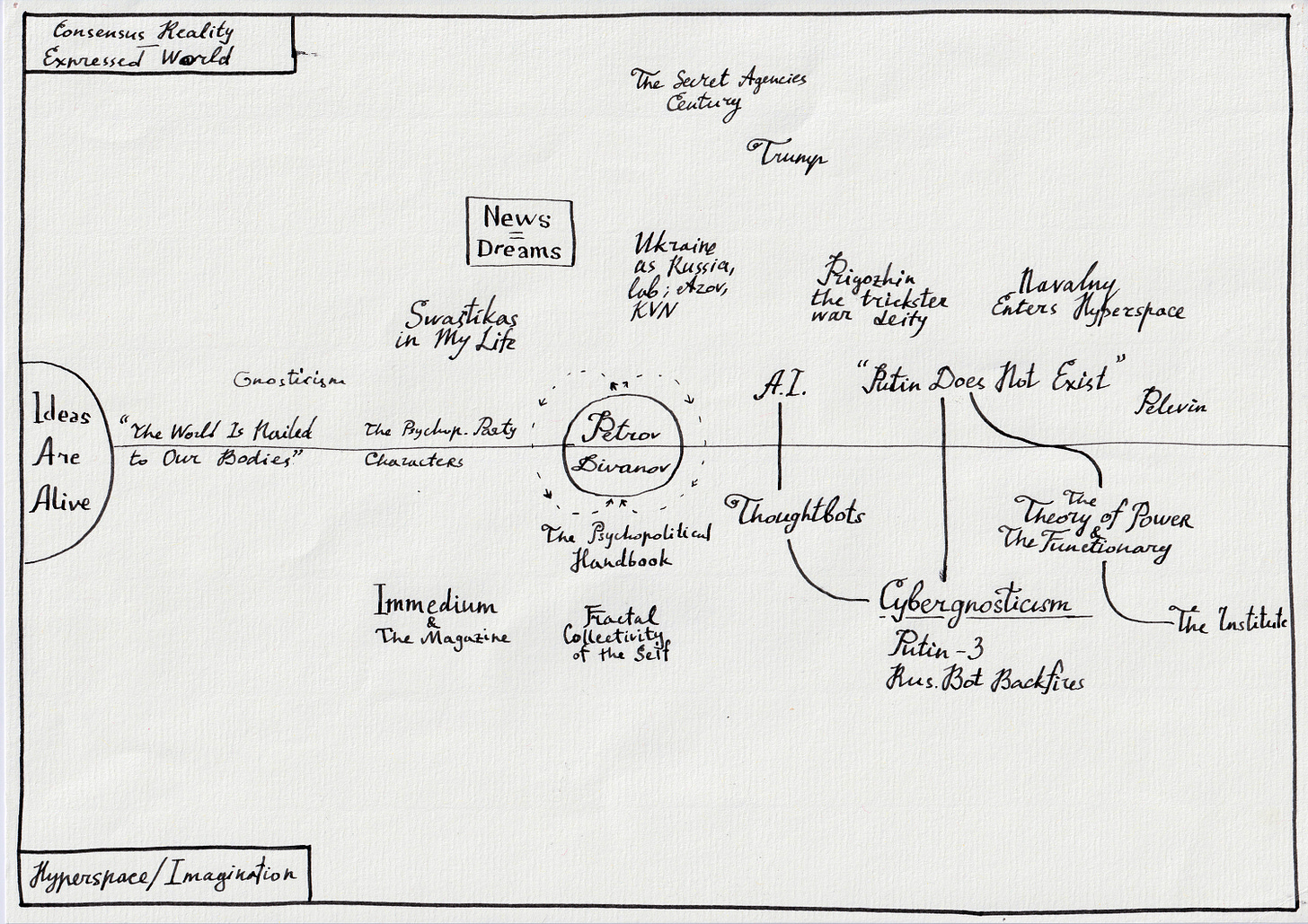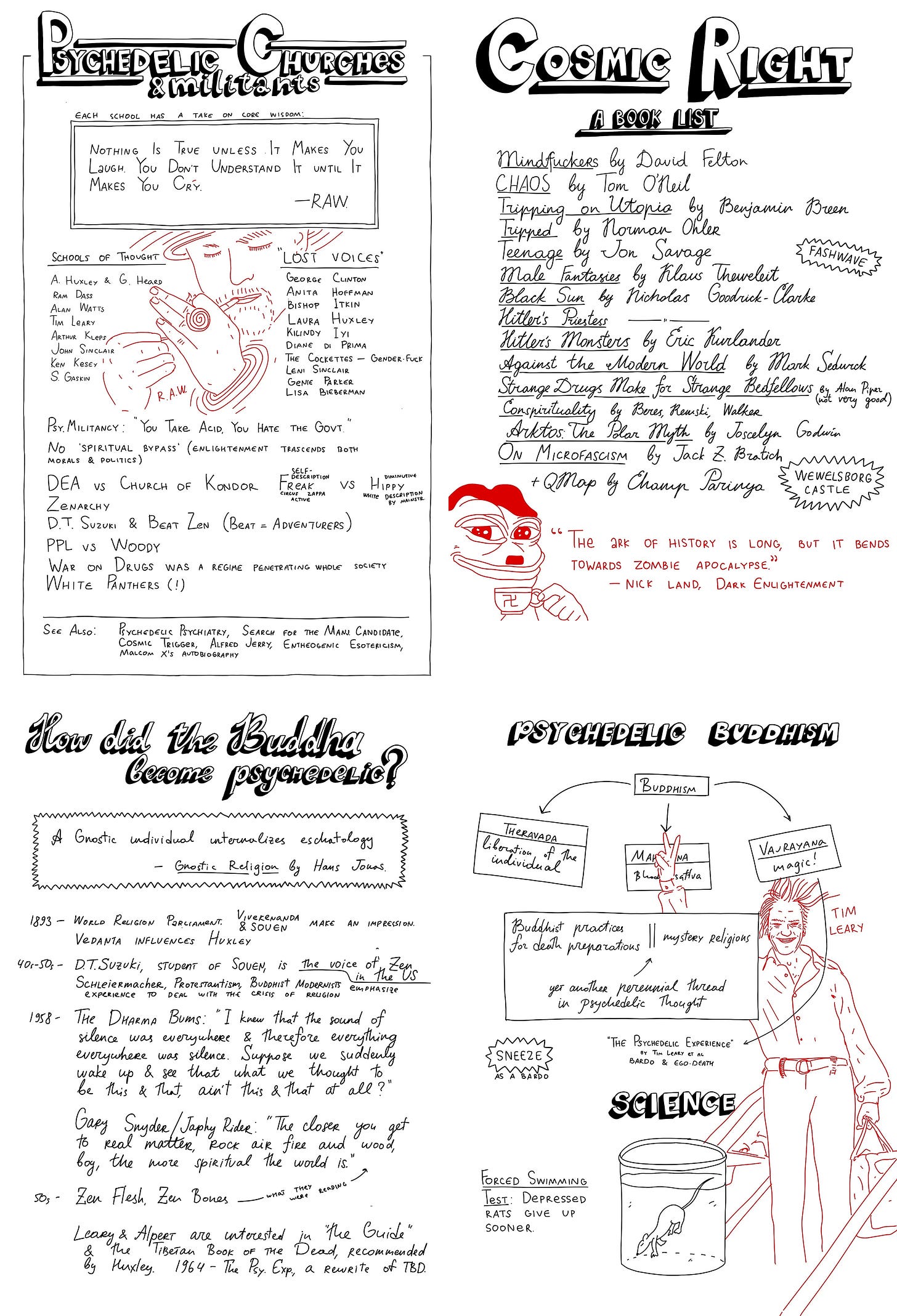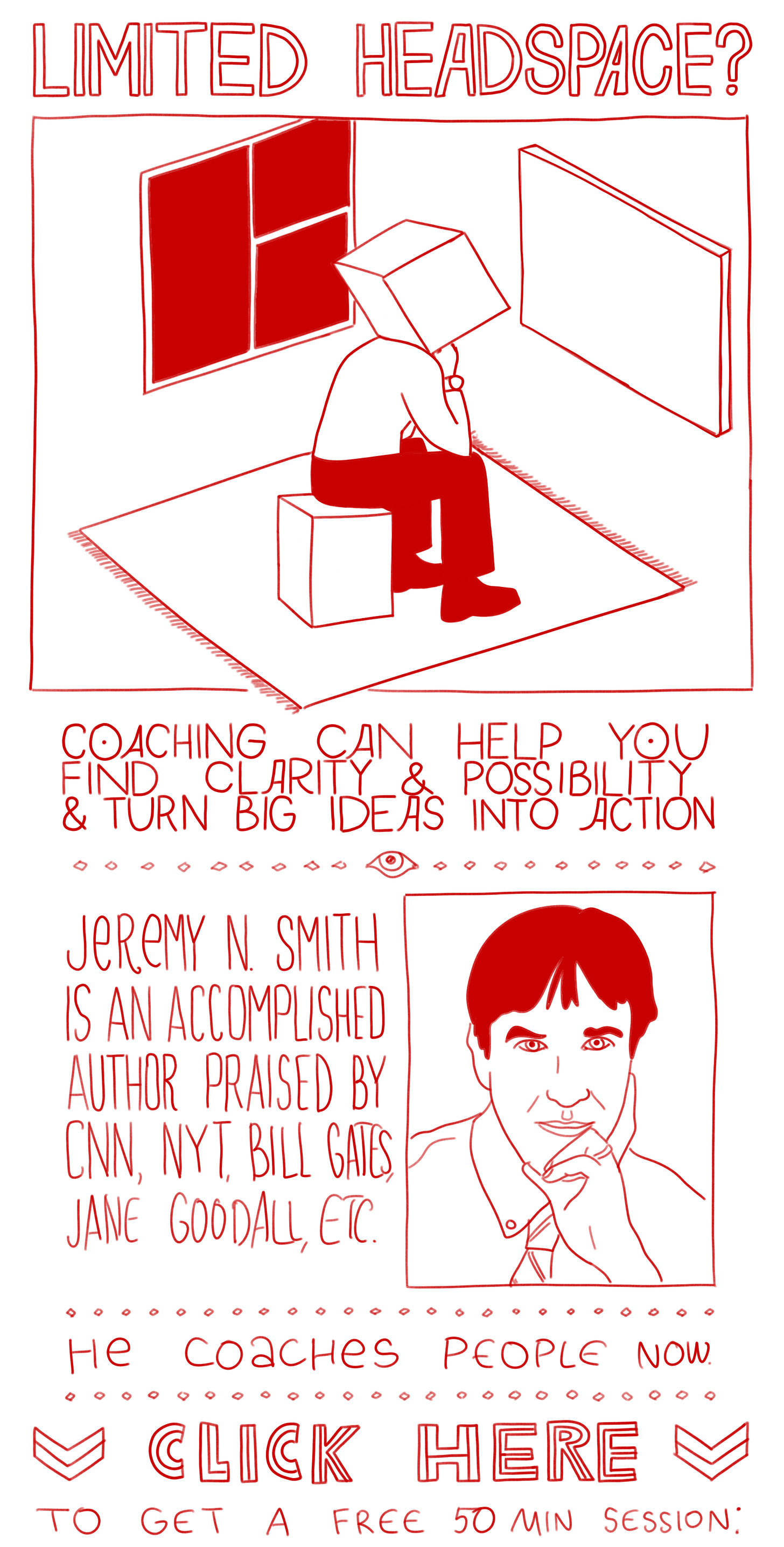A few months ago, I took this note at my local cannabis club:
It later evolved into this:
And then this:
These sketches for a grand vision were very inspiring at the time I was making them.
Each item in the schema represented a unit of meaning — idea, fact, experience or apparition — that I thought worthy of your attention and mine; each could become a text, a drawing, or a topic for conversation.
What got me excited was that it seemed I had found a way to connect all these unfinished ideas, memories and half-thoughts together and put them on equal footing — a foggy idea I had while falling asleep and a conventionally important news story got equal respect — and now, taken together, they amounted to a multidimensional map of meaning that encompassed the public, the private, the real, and the fictional. I could start writing again because now every thing I would write would add to this big beautiful vision, my work would now be coherent, even if secretly so.
Of course, I never completed that schema.
It’s now an homage to grand visions as such more than an articulation of any specific one.
Maybe the muse is something to fall in love with, but not try to marry.
In a discarded draft from late summer (all my summer drafts were discarded), I wrote:
“Moving to Spain allowed me to turn Psychopolitica into a legally recognized, above-the-ground undertaking.
Your subscription dollars go straight to my bank account, and I spend them on coffee.
A legitimate kingdom with a flag and an army takes its (massive) cut.
The money I spend on the project (a much higher amount) is subtracted from my tax base as ‘business expenditures.’
I like the air of respectability this dynamic brings out, but it also raises a question:
Historically, a big part of my business has been half-formulating grand visions and then adding them to the pile of discarded sketches and drafts.
I’m a grown-up when it comes to other people’s projects — I’m often the voice of practicality on business-related Zoom calls — but when it comes to my own aspirations, “turning pro” has been an elusive and challenging goal.
I accept it as part of the process.
What else can I do.
In July, I attended a two-week course in University of Amsterdam, led by the amazing dynamic duo of
& Christian Greer and titled The Psychedelic Universe: Global Perspectives on Higher Consciousness. It was quite an experience, and I really hope it will keep growing into something bigger with each coming year (if you’re interested in the subject, I highly recommend looking into the 2025 version, in which Erik is being swapped for Gary Laderman).
One of the most memorable guest appearances was by Ed Visser, the underground designer and printer of acid blotter — illustrated pieces of perforated blotting paper that serve as the medium for distributing LSD. If you google “bicycle ride LSD,” you’ll easily find his most famous, iconic design, created to commemorate the 50th anniversary of the inaugural 1943 trip of LSD’s accidental inventor Albert Hoffman.
As Davis (author, among other things, of the new book Blotter: The Untold Story of an Acid Medium) wisely pointed out, the art on the surface of the acid tab a psychonaut puts on her tongue is totally extraneous. It’s not necessary for the production, distribution, sale, purchase, or consumption of the drug. The only reason it exists — and there’s a whole culture around it — is because there were people, like Ed, who thought it’d be cool to create it, and did.
I don’t really remember anything specific Ed said — no story or fact or opinion. The inspiring thing was to simply find out that this dude exists, to wonder about how many people’s lives he has changed (indirectly), and to just sit around with him for a couple of hours. He had a good vibe. He brought presents: a DVD with some visuals to trip to (who even owns a DVD player?), a coaster, and a piece of Bart Simpson themed blotter (undipped).
The course was packed with information and thought and perspectives, but the main thing that stayed with me is a kind of sentimental appreciation of the people I met and observed during this couple of weeks: the talented students, mostly younger than me, mostly in the early stages of some kind of a scholarly path; the academic directors, who are creating a new field of studies with a kind of a shrug — like, why not?; and the guest lecturers, ranging from Ed, whose art career included danger of prison, to people who get hired by big corporations as “psychedelic consultants” — did you know that that’s a career, that you could make money as “a psychedelic consultant”?
So many different paths in this life.
How would you describe yours?
Any PsyPol subscriber can schedule a one-on-one Zoom call with me. I’ve talked to artists, lawyers, doctors, retirees, forklift operators, factory workers, DJs, programmers, a guy who “works in water,” and I’d like to talk to you too.
An idea I’ve been toying with for the last few weeks (why am I always “toying” and “playing” with these ideas, when will I commit to one?) is writing a short book, designed from the get-go as something perfectly doable, with a clear and not-too-complex idea behind it, with a work process that can be planned out and even put on a schedule, which I could show to an agent and, if rejected, self-publish through Amazon + share a PDF/EPUB with paying subscribers on Substack.
It’s been at least 8 years since a respectable, published author first told me that I “should write a book,” and I still get shy when thinking about it. It must have been in my early teens that I got indoctrinated into an overly romanticized view of writing — a lofty pursuit reserved for the tortured geniuses that live on a different plane; who never chose writing, who were instead chosen by the spirit of language and have to write to save their souls, or whatever. I know this is bullshit — partly because I now know writers — but these early, unarticulated beliefs can be hard to shake off.
So this exercise is me trying to get over it.
I said to myself, “What’s a funny idea you could actually turn into a publishable little volume?”
And I replied to myself, “Maybe a short self-help book rooted in Russian prison folklore seen through the prism of Gnosticism (reality = prison), with two appendices illustrated in the style of Russian criminal tattoos: (1) a guide to slav squat1 mindfulness meditation, and (2) a bodyweight exercise routine you can do anywhere where there’s a floor and a wall; all wrapped together and sold to Americans afraid of the coming totalitarianism as wisdom from people who know.”

Classifieds
Jeremy N. Smith is a very accomplished coach, creative consultant, and writer acclaimed by CNN, the New York Times, Bill Gates, and Jane Goodall, among others.
He offers a complimentary coaching session to any PsyPol subscriber.
Slav and slave are conveniently related terms.










>>>>Slav and slave are conveniently related terms.
I think this is apocryphal at best. If I remember correctly, the consensus is that "slav" is more likely related to the word "slovo", which is also all kinds of meaningful.
How would I describe my path? I'm a retired school psychologist and took a very conventional path, as I'm a very linear thinker, so it's fascinating to see the workings of a mind who is, like, the OPPOSITE of linear! :) Maybe that's why I enjoyed working with children so much. (Adults like you are lucky enough to have retained your child-like creativity and novel perspective of the world - or is that the psychedelics?! ) I found this interesting: "I could start writing again because now every thing I would write would add to this big beautiful vision, my work would now be coherent, even if secretly so. Of course, I never completed that schema." My analytical mind thought, "If something is only secretly coherent, then most people will not perceive its coherence." Most people in our linear culture have been conditioned to prefer writing that is coherent. Is that what's holding you back? Your writing in Substack is coherent, but a book is more challenging than a brief article. If writing is your dream and your passion, perhaps you could learn to be more linear/coherent if that's a concern, and if that thought does not appeal to you (as it probably wouldn't to most creatives), then maybe find an outlet for your creativity through some other medium, like your awesome artwork. Perhaps stick with humorous writing? It can be more disjointed so long as it's funny. Perhaps combine your writing and art in humorous cartoons. Too bad we don't have newspapers any more, but believe it or not, I'm a linear-minded person who owns quite a few cartoon books! I laughed out loud at the proposed audience of your book, "Americans afraid of the coming totalitarianism as wisdom from people who know.” Maybe that says more about me! Even if you can't help the half of us Americans who are fearful, perhaps you can help us cope by employing your humor!